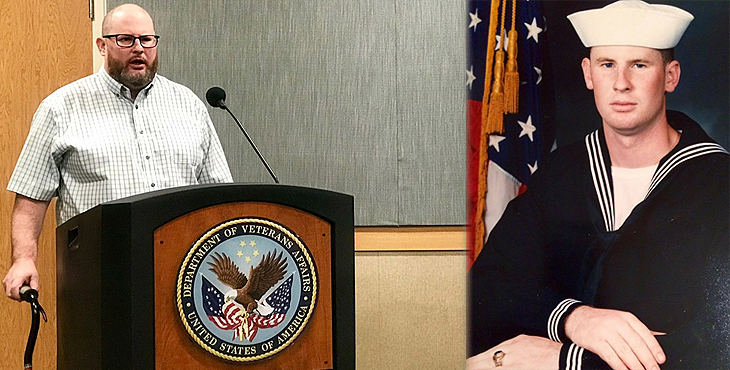
During his first year of chemotherapy, Navy Veteran Patrick McGuire lost 100 pounds and was wheelchair bound for several months. He was unable to swallow food and used a walker. Against all odds, Patrick recovered and will be one of the first participants in PHASeR testing at Durham VA Health Care System. Official VA photo by Ms. Ashleigh Barry
The U.S. Department of Veterans Affairs (VA), in partnership with Sanford Health, one of the nation’s largest nonprofit health care systems, recently announced it will soon provide free genetic testing to cancer survivors cared for by VA.
Patrick McGuire, 45, a Navy Veteran and stage 4 lung cancer survivor, is encouraged that he will be one of the first participants at the Durham VA Health Care System launch site. He was diagnosed with cancer in 2015.
He underwent multiple surgeries for tumors in his brain and lungs in addition to a host of other ailments. He was initially treated outside of the VA and was prescribed medications that did not interact well with him. After seeing VA doctors, his condition improved, and he had fewer adverse reactions to treatment.
“I’ve got so much more to give,” McGuire said. “Rather than dying of cancer, I’m living with cancer.”
Dr. Michael Kelley, chief of hematology and oncology at Durham VA Medical Center, said McGuire has benefited from a core concept in precision medicine.
“DNA sequencing on his tumors found a particular gene mutation that we have a drug for…and he reacted well with very few side effects,” Kelley said. “He’s able to receive it when he really needs it.”
The VA PHarmacogenomics Action for cancer SuRvivorship (PHASeR) testing program will launch this year at the Durham facility, and will enroll all cancer survivors who receive treatment at the facility. The program will expand to enroll 250,000 Veterans at 125 sites around the country.
“We are excited about the possibilities and look forward to inviting the first PHASeR participants in the Durham, North Carolina area, as we kick off testing at the launch site in the coming months,” said Dr. Deepak Voora, VA PHASeR p director.

Navy Veteran Patrick McGuire, a stage 4 cancer survivor, will be one of the first participants of the PHASeR testing at the Durham VA Health Care System. Testing was made possible, thanks to a $25 million gift from philanthropist Denny Sanford with a matching donation from Sanford Health. Official VA photo by Ms. Ashleigh Barry

Patrick McGuire, 45, a Navy Veteran and stage 4 lung cancer survivor, is encouraged that he will be one of the first participants at the Durham VA Health Care System launch site. He was diagnosed with cancer in 2015. Photo courtesy of Mr. Patrick McGuire
“It’s hard to predict how patients will respond to a medication or dosage, but PHASeR testing will allow providers to make better decisions about Veteran’s health care,” Voora said.
McGuire praised both VA and Sanford Health in the decision to offer free testing for cancer survivors and for the strong support of Veterans around the country.
“By Sanford giving us a chance to get that information, that’s fantastic…and a lifesaver,” McGuire said. “I don’t want to leave here anytime soon. I love my wife, my daughter and my church. They all pray for me and are supportive.”
Following his final chemotherapy treatment, McGuire used a wheelchair for several months due to the loss of muscle and strength. He was unable to swallow from the radiation damage to his esophagus. He worked hard in physical therapy and progressed to a walker and cane. Against all odds, he recovered. Today, he rarely uses his cane at all.
Deborah Scher, executive advisor to the Secretary’s Center for Strategic Partnerships, said the PHASeR testing program is another example of using partnerships to improve Veterans’ lives through big, bold and impactful innovations.
“The PHASeR testing program will enhance VA’s ability to meet new and emerging needs for Veterans, their families and caregivers,” Scher said. “Our partners support VA in ways that are essential to the successful delivery of health care to our Veterans.”
McGuire said one of the most important reasons for beating cancer is to see his 17-year-old daughter get married someday.
“I’m going to walk her down the aisle when she gets married,” he said. “I’m her dad and I love her a lot.”
He’s excited about the potential and the impact pharmacogenetic testing will have on him and other Veterans fighting cancer.

Topics in this story
More Stories
The Medical Foster Home program offers Veterans an alternative to nursing homes.
Watch the Under Secretary for Health and a panel of experts discuss VA Health Connect tele-emergency care.
The 2024 National Veteran Suicide Prevention Annual Report provides the foundation for VA’s suicide prevention programs and initiatives.






